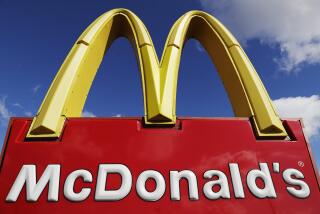Weighty Controversy : Health: A self-styled consumer health advocate lashes out at the fat content of McDonald’s products. But the fast-food company says the ads are reckless and misleading.
- Share via
Nobody likes being called fat, including McDonald’s.
The world’s largest fast-food chain on Wednesday denounced full-page newspaper advertisements that stated “McDonald’s, Your Hamburgers Have Too Much Fat!” and urged the company and other restaurants to reduce the fat in their hamburger meat by 10%.
“It is reckless, it is misleading and we think it is intended more to scare people than to inform them,” said McDonald’s spokesman Chuck Rubner.
The ads were paid for by Phil Sokolof, a wealthy Omaha, Neb., manufacturing executive and self-styled consumer health advocate. His previous ads have attacked the use of palm and coconut oils in cookies and other prepared foods.
After the publication of those ads last year and in 1988, numerous food makers--including Keebler and Pepperidge Farms--agreed to cut back or eliminate tropical oils, which are high in saturated fat. Saturated fat consumption can increase cholesterol levels and lead to heart disease, many health officials say.
In Wednesday’s ads, which ran in newspapers that included the Wall Street Journal and USA Today, Sokolof’s National Heart Savers Assn. took aim at saturated fats in beef and dairy products. Topped by a large headline that read “The Poisoning of America,” the ad urged readers to “Eat smaller portions of leaner meats and lower fat dairy products.”
The ad also said McDonald’s Big Mac and a bag of french fries contain 25 grams of saturated fats, and one ounce of Kraft American cheese contains 5.5 grams. Most health guidelines recommend individuals limit daily saturated fat consumption to 22 grams.
But McDonald’s disputed Sokolof’s claims, saying that it already uses lean beef and that its Big Mac and fries contain anywhere from 15 to 19 grams of saturated fat. The chain noted that the fat content of its hamburger meat ranges from 17% to 19%--not the 21.5% Sokolof claims in his ad.
McDonald’s also announced that its U.S. outlets are in the process of introducing low-fat milk shakes and frozen yogurt. Additionally, the chain is testing a less fatty, 100% vegetable shortening to fry potatoes, which are currently immersed in a combination of vegetable and animal fats.
“This continues this whole idea of the nutritional evolution of the menu,” said Rubner.
McDonald’s was not the only one upset at Sokolof’s ads.
“The way the ad is presented it tends to ignore the total diet,” said Lisa Coe, spokeswoman for the United Dairy Industry Assn. Coe noted that consumers can balance their consumption of high fat foods with less fatty alternatives to keep their total fat intake within recommended guidelines. “It’s all a trade-off.”
Some newspapers, including The Times, refused to run the ad. Times spokeswoman Laura Morgan said the paper rejected the ad because it was believed to be unfair, and The Times feared the legal liability of running an ad that made accusations against a particular company.
Sokolof--who suffered a heart attack 24 years ago that he blamed on high cholesterol levels--and his high-profile campaign were supported by the Center for Science in the Public Interest, a Washington-based advocacy group.
“His attempt to alert people to the dangers of saturated fat is a good one,” said Jayne Hurley, the center’s nutritionist. “Americans are eating way too much saturated fat.”
She noted that Sokolof’s ads aimed at palm and coconut oils garnered more attention and had more impact than years of studies and lobbying by her own group.
“It certainly shows how effective one person with a lot of money can be,” said Hurley.
More to Read
Inside the business of entertainment
The Wide Shot brings you news, analysis and insights on everything from streaming wars to production — and what it all means for the future.
You may occasionally receive promotional content from the Los Angeles Times.










